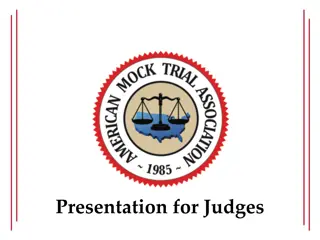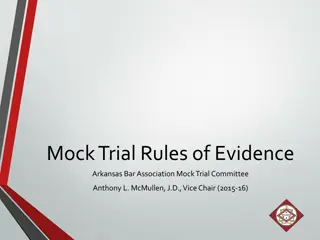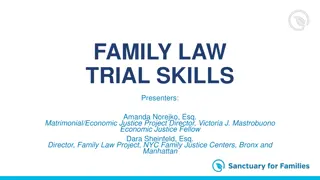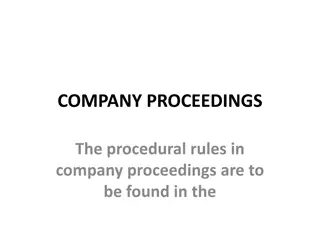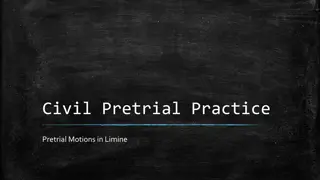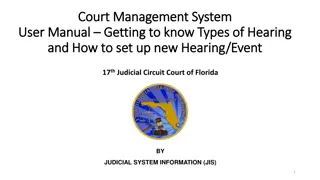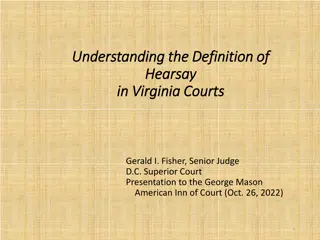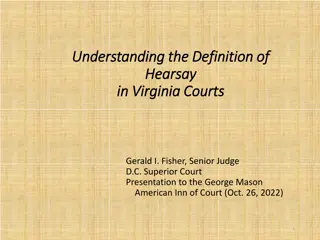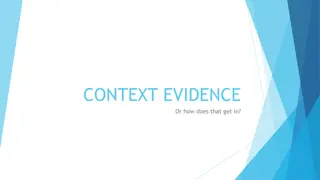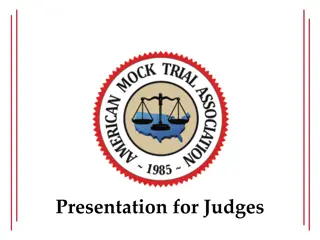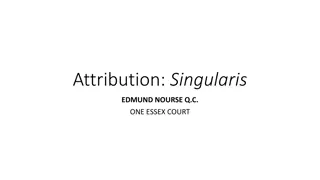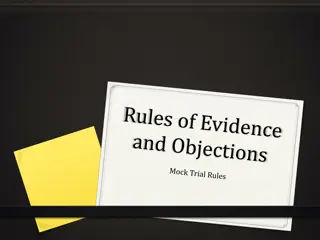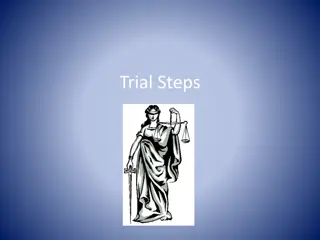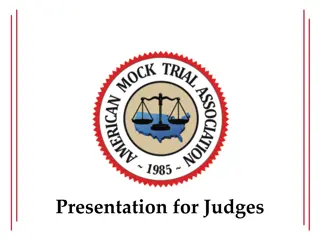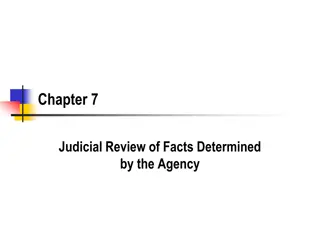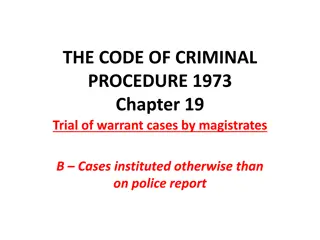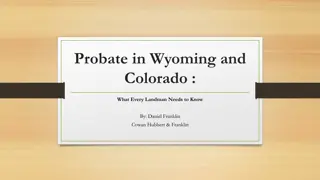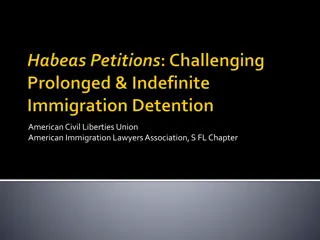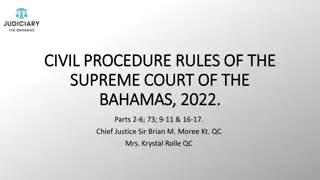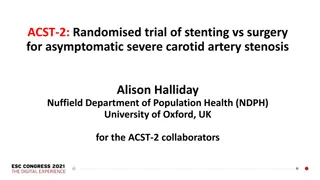Understanding Simplified Rules of Evidence in Trial Proceedings
Simplified Rules of Evidence outline key principles such as leading questions, narration, relevance, hearsay, opinions, and procedures in a nutshell. Admissibility of evidence depends on arguments as well. Learn how to handle objections effectively to navigate legal proceedings smoothly.
Download Presentation

Please find below an Image/Link to download the presentation.
The content on the website is provided AS IS for your information and personal use only. It may not be sold, licensed, or shared on other websites without obtaining consent from the author. Download presentation by click this link. If you encounter any issues during the download, it is possible that the publisher has removed the file from their server.
E N D
Presentation Transcript
In a nutshell Rule 1: Leading Questions Rule 2: Narration Rule 3: Relevance Rule 4: Hearsay Rule 5: Firsthand Knowledge Rule 6: Opinions Rule 7: Opinions on the Ultimate Issue Rule 8: Additional Rules of Evidence One horse, one rider Cross is not limited to the scope of direct Redirect is no more than two questions, and redirect IS limited to the scope of cross-examination Rule 9: Special Procedures
But first The admissibility of evidence (as an exhibit as well as testimony itself) in trial is often NOT cut and dry Admissibility is sometimes governed more by your ARGUMENT and less by the actual rules of evidence
But first Objection: argumentative!!! While there doesn t appear to be anything in the Simplified Rules of Evidence regarding objecting to argumentation during opening statements, I am instructing my kids to object on opening for argumentation.
Rule 1: Leading Questions A leading question is one that suggests the answer desired by the questioner, usually by stating some facts not previously discussed and then asking the witness to give a yes or no answer. When can you lead? When can t you lead? https://www.youtube.com/watch?v=dBP2if0l-a8 (start at 7:56, end at 10:30) the lawyer sings the song Legal objection: Objection, Your Honor: leading
Rephrase Into Leading Questions 1. Are the Golden State Warriors the most unlikeable team in the NBA? 2. Do you enjoy prosecuting juveniles? 3. Does Harvard have the best rowing team in the Ivy League? 4. Are you a Hemingway Man? 5. Sorry, Kevin, I ve got nothing for ya
Rule 2: Narration Narration occurs when the witness provides more information than the question called for. Who would object to narration? Direct or cross examiner? Tip: You don t want to annoy the judge with petty objections, but you also don t want to let a witness tell his or her life story Legal objection: Objection, Your Honor: narrative
Rule 3: Relevance Questions and answers must relate to the subject matter of the case; this is called relevance. Questions or answers that do not relate to the case are irrelevant. Legal objection: Objection, Your Honor: relevance (or some derivation therefrom) Strict or loose standard? One yard up the football field
Thought Experiments In a trial where the defendant is accused of murder and takes the stand, the defense attorney asks, on direct-examination, what time the defendant is done with work on Fridays. The prosecutor objects to relevance. If you re the defense attorney, what is your response?
Thought Experiments In a trial where defendant is accused of stealing candy from a grocery store, the prosecution asks the defendant s former lover, on direct-examination, whether the defendant ever celebrated Valentine s Day with the witness. Defense counsel objects. As the prosecutor, what is your response?
Thought Experiments On trial for conspiracy to commit mass murder, defense counsel asks the witness, a longtime friend of the defendant s, whether the defendant s house was connected to the internet. The prosecution objects to relevance. As the defense attorney, what is your response?
Rule 4: Hearsay Hearsay is something the witness has heard someone say outside the courtroom. Also, any written statement made outside the courtroom is hearsay. Two exceptions: 1. When the witness is repeating a statement made directly to the witness by one of the witnesses in the case; and 2. If one of the witnesses is repeating a statement made by an individual who is no longer alive One of these will NOT come into play Legal objection: Objection, Your Honor, hearsay (or some derivation therefrom)
Hearsay? Eric, on the witness stand, testifies: Jonathan told me that Derek was jealous of our evidence knowledge. Assume Jonathan is a witness in this case Assume Jonathan is NOT a witness in this case
Hearsay? Derek, on the witness stand, testifies: I lied when I told Kevin I ve read Hemingway novels.
Hearsay? Molly, on the witness stand: I cried tears of joy when I saw online that the Chainsmokers are going to ACL.
Hearsay? Ellen, on the witness stand: What Eric said about Bernie Sanders on the witness stand is ridiculous, ignorant, and betrays a total lack of dignity or self-awareness.
Hearsay? Kathryn on the witness stand: On the way to trial, my conscience told me that I should seek the death penalty for this juvenile. And so I listened.
Hearsay? Kevin, on the witness stand: Jonathan said that Bryce said to pick up beer at the Chevron.
Rule 5: Firsthand Knowledge Witnesses must have directly seen, heard, or experienced whatever it is they are testifying about. Legal objection: Objection, Your Honor, the witness lacks firsthand knowledge Keep this objection in mind for when the witness is SPECULATING!!!
Does the witness have firsthand knowledge? Kevin, on the witness stand: All the people I live with are bad people.
Does the witness have firsthand knowledge? Jonathan, on the witness stand: Cornell University has a severe heroin problem because heroin makes you feel soooooooooooooo good.
Does the witness have firsthand knowledge? Kathryn, on the witness stand: Objectively, there is no better person in the world than Alex Tijerina.
Lack of firsthand knowledge? Derek, on the witness stand: Every Hemingway novel is better than The Great Gatsby.
Lack of firsthand knowledge? Molly, on the witness stand: Rick punched that guy in the ear. Assume Molly was in Baton Rouge on the day in question, when Rick was in Houston. Assume Molly was in Houston on the day in question, when Rick was in Houston. More facts needed?
Rule 6: Opinions Unless a witness is qualified as an expert in the appropriate field, such as medicine or ballistics, the witness may not give an opinion about matters relating to that field. Exception: a lay witness may give an opinion based on common experience. Firsthand knowledge? Legal objection: Your Honor, this is an improper opinion.
Proper or improper opinion? Eric, on the witness stand: I think Dead Scalia is a charlatan and a fraud.
Proper or improper opinion? Derek: When I wrecked my car, I knew my leg was broken vs. When I wrecked my car, I knew my femur had been severed in three parts and I tore my femoral artery.
Proper or improper opinion? Rick: In my opinion, kids do not have a reasonable expectation of privacy when they re at school.
Rule 7: Opinions on the Ultimate Issue Witnesses, including experts, cannot give opinions on the ultimate issue of the case: the guilt or innocence of the defendant or the liability of the parties. These are matters for the trier of fact to decide. Legal objection: Objection, Your Honor, this is an opinion on an ultimate issue
Objectionable? Jonathan, on the witness stand: The defendant is guilty of murder. Molly, on the witness stand: In my personal opinion, the defendant shouldn t have done what he did, so in my opinion he s guilty. Derek, on the witness stand: The defendant is guilty of being a narcissist.
Objectionable? Kathryn: I think that the defendant shot and killed the victim with malice aforethought. Kevin, in a murder trial: I believe the defendant did nothing wrong. Rick, in a murder trial: I believe the defendant did nothing wrong; therefore, he is innocent.
Rule 8: Additional Rules One horse, one rider Cross-examination is not limited to the scope of direct examination Redirect is limited to two questions and must be limited to the scope of cross
Rule 9: Special Procedures Introduction of Documents or Physical Evidence Predicate Can you please identify this item? Lead on cross Moving the Document or Item Into Evidence When to object?
Rule 9: Special Procedures Impeachment Prior conduct Criminal convictions Past inconsistent statement Step 1: Repeat statement from direct that contradicts the affidavit Step 2: Introduce affidavit for ID Step 3: Have the witness read from his or her affidavit the part that contradicts the statement MUST HAVE CONTRADICTED AFFIDAVIT ON DIRECT FOR PROPER IMPEACHMENT??? Nah!!!!
Rule 9: Special Procedures Qualifying an expert There are two steps: 1. Lay a foundation for expert status (knowledge, skill, training, and/or experience) 2. Tender the witness as an expert Your Honor, at this time the defense tenders Molly Bagshaw as an expert in sociology. Strategy: the scope of expertise But see Rule 7, Opinions on an Ultimate Issue: experts cannot give opinions on ultimate issues Are there any experts in our fact pattern?


